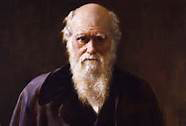Charles Robert Darwin was born in Shrewsbury, Shropshire, England, on 12 February 1809 at his family home, The Mount. He was the fifth of six children of wealthy society doctor and financier Robert Darwin, and Susannah Darwin (née Wedgwood). He was the grandson of two prominent abolitionists: Erasmus Darwin on his father’s side, and of Josiah Wedgwood on his mother’s side.

Both families were largely Unitarian, though the Wedgwoods were adopting Anglicanism. Robert Darwin, himself quietly a freethinker, had baby Charles baptised in November 1809 in the Anglican St Chad’s Church, Shrewsbury, but Charles and his siblings attended the Unitarian chapel with their mother. The eight-year-old Charles already had a taste for natural history and collecting when he joined the day school run by its preacher in 1817. That July, his mother died. From September 1818 he joined his older brother Erasmus attending the nearby Anglican Shrewsbury School as a boarder. Darwin spent the summer of 1825 as an apprentice doctor, helping his father treat the poor of Shropshire, before going to the University of Edinburgh Medical School, at the time the best medical school in the UK, with his brother Erasmus in October 1825. He found lectures dull and surgery distressing, so neglected his studies. He learned taxidermy from John Edmonstone, a freed black slave who had accompanied Charles Waterton in the South American rainforest, and often sat with this “very pleasant and intelligent man.”
Darwinism is a theory of biological evolution developed by Charles Darwin and others, stating that all species of organisms arise and develop through the natural selection of small, inherited variations that increase the individual’s ability to compete, survive, and reproduce. Also called Darwinian theory. It originally included the broad concepts of transmutation of species or of evolution which gained general scientific acceptance when Charles Darwin published On the Origin of Species, including concepts which predated Darwin’s theories, but subsequently referred to specific concepts of natural selection, the Weismann barrier or in genetics the central dogma of molecular biology.[1] Though it usually refers strictly to biological evolution, the term has been used by creationists to refer to the origin of life, and has even been applied to concepts of cosmic evolution, both fields which have no connection to Darwin’s work. It is therefore considered the belief and acceptance of Darwin’s, and his predecessors, work in place of other theories including divine design and extraterrestrial origins.
The meaning of “Darwinism” has changed over time, and varies depending on its context.[4] In the United States, the term “Darwinism” is often used by creationists as a pejorative term in reference to beliefs such as atheistic naturalism, but in the United Kingdom the term has no negative connotations, being freely used as a shorthand for the body of theory dealing with evolution, and in particular, evolution by natural selection.[5]
The term was coined by Thomas Henry Huxley in April 1860,[6] and was used to describe evolutionary concepts in general, including earlier concepts such as Spencerism. Many of the proponents of Darwinism at that time, including Huxley, had reservations about the significance of natural selection, and Darwin himself gave credence to what was later called Lamarckism. The strict neo-Darwinism of August Weismann gained few supporters in the late 19th century. During this period, which has been called “the eclipse of Darwinism”, scientists proposed various alternative evolutionary mechanisms which eventually proved untenable. The development of the modern evolutionary synthesis from the 1930s to the 1950s, incorporating natural selection with population genetics and Mendelian genetics, revived Darwinism in an updated form.[7]
While the term has remained in use amongst scientific authors when referring to modern evolutionary theory, it has increasingly been argued that it is an inappropriate term for modern evolutionary theory. For example, Darwin was unfamiliar with the work of Gregor Mendel, and as a result had only a vague and inaccurate understanding of heredity. He naturally had no inkling of yet more recent developments and, like Mendel himself, knew nothing of genetic drift for example.
Darwinism” soon came to stand for an entire range of evolutionary (and often revolutionary) philosophies about both biology and society. One of the more prominent approaches, summed in the 1864 phrase “survival of the fittest” by the philosopher Herbert Spencer, later became emblematic of Darwinism even though Spencer’s own understanding of evolution (as expressed in 1857) was more similar to that of Jean-Baptiste Lamarck than to that of Darwin, and predated the publication of Darwin’s theory in 1859. What is now called “Social Darwinism” was, in its day, synonymous with “Darwinism” — the application of Darwinian principles of “struggle” to society, usually in support of anti-philanthropic political agenda. Another interpretation, one notably favoured by Darwin’s half-cousin Francis Galton, was that “Darwinism” implied that because natural selection was apparently no longer working on “civilized” people, it was possible for “inferior” strains of people (who would normally be filtered out of the gene pool) to overwhelm the “superior” strains, and voluntary corrective measures would be desirable — the foundation of eugenics.
In Darwin’s day there was no rigid definition of the term “Darwinism,” and it was used by opponents and proponents of Darwin’s biological theory alike to mean whatever they wanted it to in a larger context. The ideas had international influence, and Ernst Haeckel developed what was known as Darwinismus in Germany, although, like Spencer’s “evolution”, Haeckel’s “Darwinism” had only a rough resemblance to the theory of Charles Darwin, and was not centred on natural selection at all. In 1886 Alfred Russel Wallace went on a lecture tour across the United States, starting in New York and going via Boston, Washington, Kansas, Iowa and Nebraska to California, lecturing on what he called “Darwinism” without any problems. 9Source Wikipedia)



.jpg)











